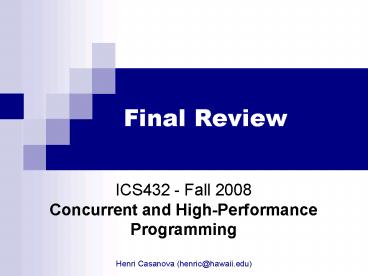Final Review - PowerPoint PPT Presentation
1 / 14
Title:
Final Review
Description:
If you've done the homework assignments, and were able to do similar questions ... When accessing elements row-wise for a 2-D array stored in row-major, one incurs ... – PowerPoint PPT presentation
Number of Views:63
Avg rating:3.0/5.0
Title: Final Review
1
Final Review
2
What Questions on the Final?
- Three categories of questions
- Some questions going back to the midterm
- Quite a few what is this?, explain that
questions about concepts - in lecture notes starting with the Transaction
Memory notes - Some actual exercises about concepts/techniques
- in lecture notes starting with the Transaction
Memory notes - Lets review possibilities for the above three
categories
3
Midterm-like Questions
- (Just tell me if you want to receive midterm
solutions) - The what do threads share? question!
- One look at code and see whats wrong questions
- Pthread or Java
- One write a simple piece of code questions
- Pseudo-code or Java
- If youve done the homework assignments, and were
able to do similar questions on the midterm,
these should be no problem whatsoever
4
Concept Questions
Questions like what is XXX?, explain how XXX
works, what is the motivation for XXX?, what
is a drawback of XXX?, etc
- Transaction Memory
- Pipelining
- Vector instructions
- Multi-threaded architectures (Hyperthreading,
etc.) - Moores Law
- Shared/Private caches
- Cache coherence
- Ways to time code
- Speedup/Efficiency
- The memory bottleneck, locality,
row-major/column-major
- Amdahls law
- Profiler
- Types of shared-memory programs
- Load-balancing
- Scheduling notions, particularly in OpenMP
- Code optimization
- Parallel computing (methods, Top500)
- Large-scale volunteer computing (SETI_at_home)
- Peer-to-peer systems
5
Sample Concept Questions
- Why do people think that transaction memory is a
good thing? - Give two examples of where pipelining may occur
when a program runs on a computer - Whats the idea behind vector instructions?
- Why is Hyperthreading a good idea?
- Is Moores Law still true?
- Are L1 caches typically shared among cores?
- What is memory bus snooping used for?
- What is the definition of parallel efficiency
- What is the technological solution to slow main
memory - What are the two kinds of locality?
- State Amdahls law
- Why is a profiler useful?
- Give an example of a program that would require
load balancing among threads - What is loop unrolling?
- What type of spercomputers are most common today
in the Top500 list - What about the SETI application make it amenable
to volunteer computing - How is content found in unstructured p2p systems?
6
Key Areas
- Parallel Speedup/Eff
- The Memory hierarchy
- Matrix multiplication
- Counting cache misses
- OpenMP Scheduling
- Program Optimization
7
Concurrency and Performance
- The metric for parallel/concurrent performance
the parallel speedup - speedup (sequential exec time) / (parallel exec
time) - Typically one doesnt know how to parallelize the
entire program - There is only a fraction, say f, that can be
parallelize - Sometimes its (1-f) that can be parallelize,
depending on people/exercise - When reasoning about the parallel speedup, one
typically assumes perfect parallelization - If the parallelizable portion of the code takes
time T, the the parallelized same portion takes
time T/p on p cores. - The metric used to see how well the processors
are utilized is the parallel efficiency - efficiency (speedup) / (number of cores)
8
Amdahls Law
- Consider a program that runs in time T on 1 core
- Consider that one knows how parallelize a
fraction f of that time - Then, the execution on p cores is
- (1-f) T f T / p
- Therefore, the speedup is
- T / (1-f) T f T / p
- 1 / (1-f) f / p (an upper bound is
1/f) - And the parallel efficiency is
- 1 / (1-f) p f
9
How to Remember Amdahls Law?
- speedup 1 / (1 - f f/p)
- 1 sequential time
- -f I remove the non-parallelizable portion of
the sequential time - f/p I replace it by its (perfectly)
parallelized version
10
Sample Exercises
- Consider a sequential program. I know how to
parallelize 70 of it. I have a 32-core machine.
What is the speedup I can hope to achieve? - What fraction of a program should be
parallelizable so that it can run at gt50
efficiency on 10 cores? - I want to run a program at 80 efficiency,
knowing that I can parallelize 90 of it. What is
the maximum number of cores I can use? And what
is the speedup?
11
Programming for the Memory Hierarchy
- Row-major vs. Column-major
- When accessing elements row-wise for a 2-D array
stored in row-major, one incurs a cache miss
every (cache line size) / (element size) memory
access - When accessing elements column-wise for a 2-D
array stored in column-major, one incurs a cache
miss for every memory access - Loop ordering for the matrix-multiplication
- Three kinds of accesses
- constant, sequential, strided
- great, ok, bad
- see lecture slides about the optimal loop
ordering for matrix multiplication - should we look at them now?
12
Sample Exercise
- Consider the following code
- int A100100
- for (i0 ilt100 i)
- for (j0 jlt100 j)
- aij 1
- How many cache misses if the cache line size is
64 bytes?
13
Scheduling
- You should know the three OpenMP sheduling modes
of course - If all iterations of a loop take the same time,
do we go faster with schedule(static) or
schedule(dynamic)? - Why may one prefer schedule(guided) to
schedule(dynamic)? - Why does OpenMP let us specify a chunk size?
14
Thats it
- The final is on Thursday 12/18 at 215PM
- You should take a calculator for the exam
- for speedup computations
- any other questions?































